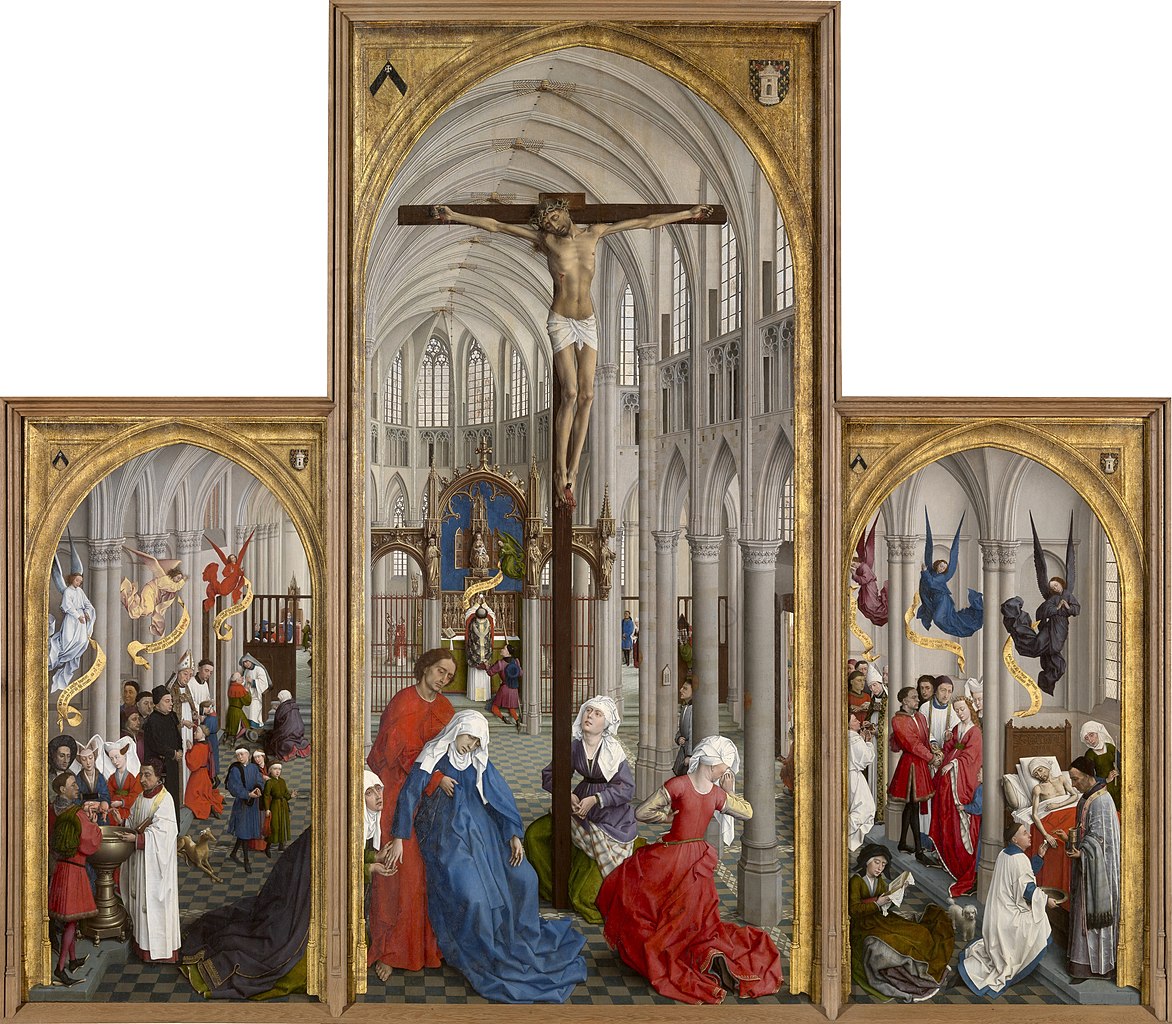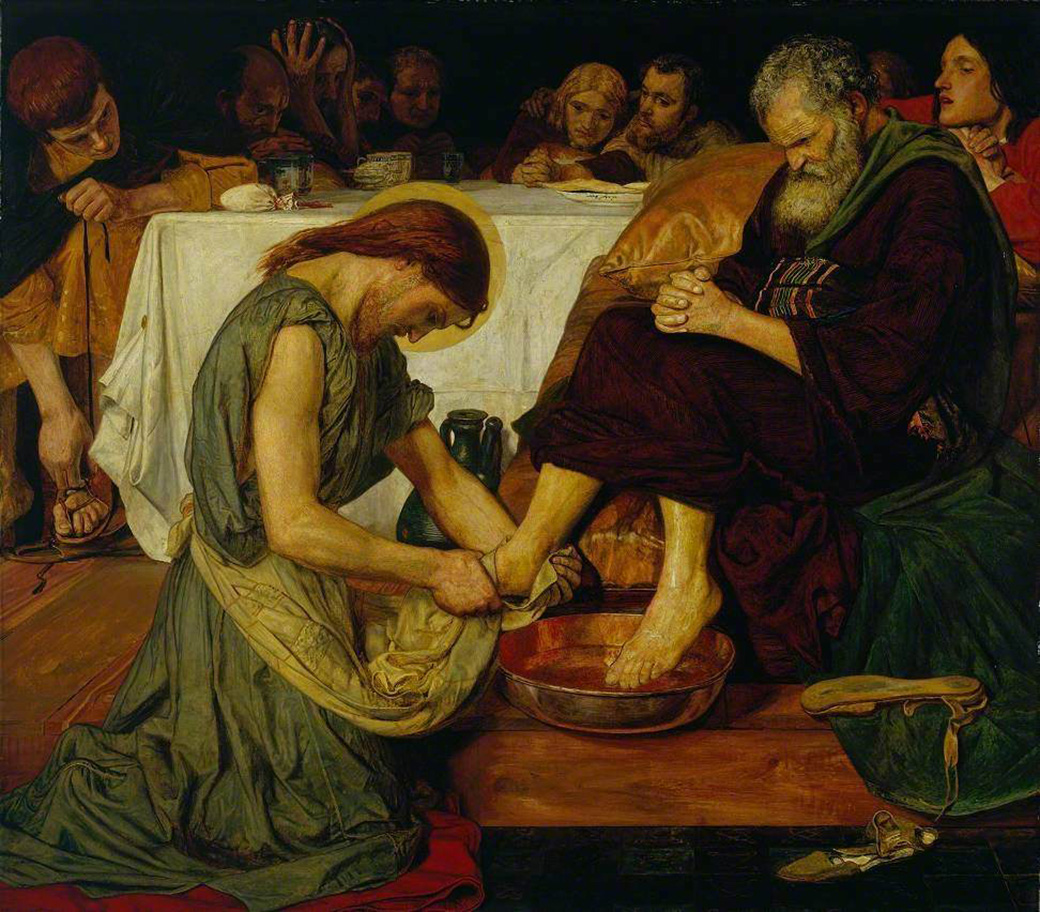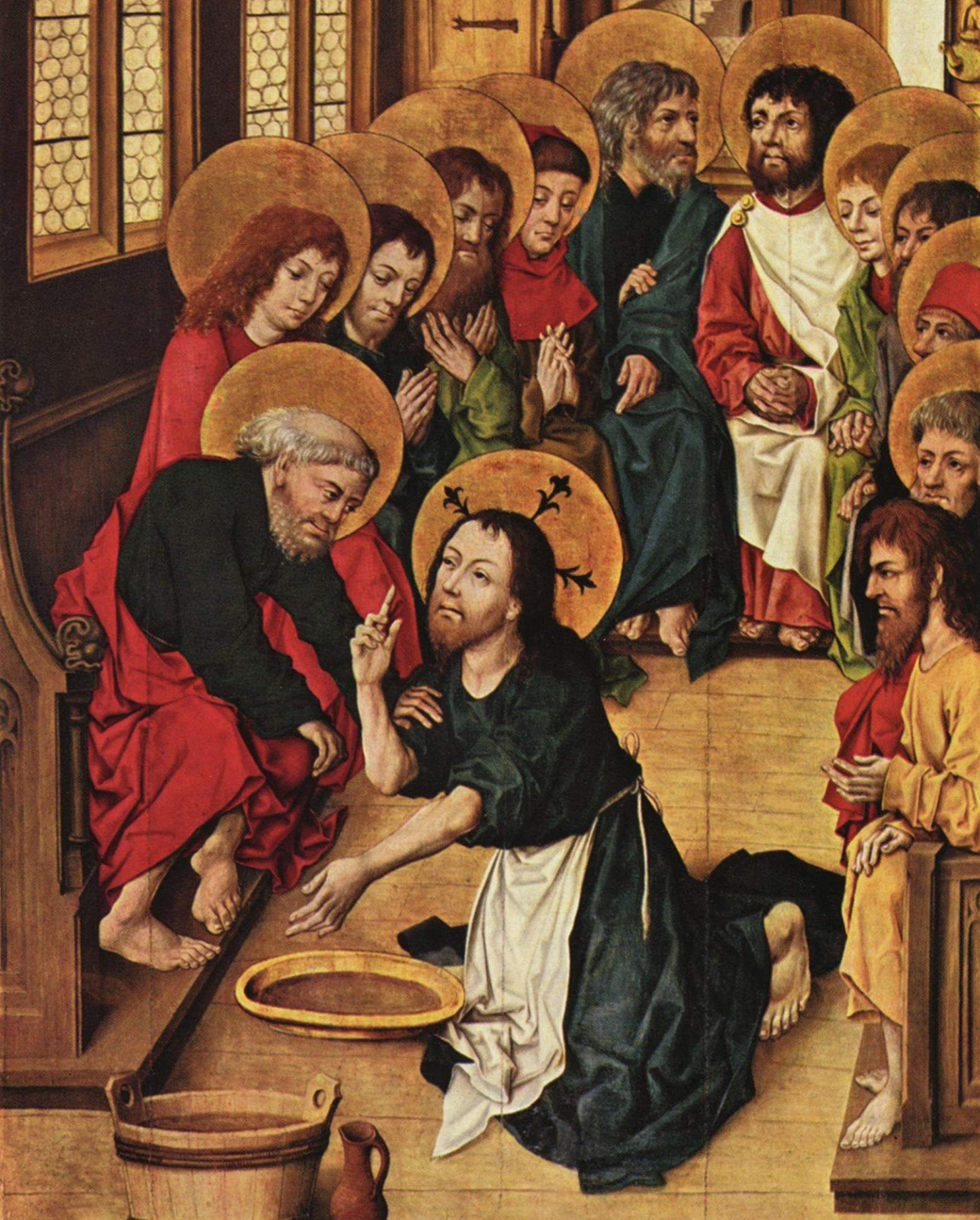Holy Thursday – Evening Mass of the Lord’s Supper: Exodus 12:1-8, 11-14, 1 Corinthians 11:23-26, John 13:1-15.
The Easter Triduum begins tonight with the Evening Mass of the Lord’s Supper. As I consider the readings for tonight’s Mass, I am struck by the tightly knit, condensed sequence of action and meaning that Christ gives us. The readings can barely contain it, for He not only provides the full meaning of millennia of Jewish ritual practices, He also institutes new sacraments in His actions and self that have never existed until this moment.

This is the reason that the Easter Triduum is the high point of our liturgical calendar, that these three days are considered their own liturgical season, outside of Lent. The density of the mystery at work in the world, like a spiritual supernova touched down on the earth, is simply too great for humanity to take in. It took the Church centuries to unpack, appreciate, and codify the depth of what happened, all the while maintaining steadfast faith and devotion to the sacraments instituted by our Savior. Thankfully, the Church has always been guided by the Holy Spirit, as Christ promised.
I will try to lay out just the high points as I see them:
- Jesus institutes our greatest sacrament, the Eucharist, which not only helps to make sense of the Passover rituals observed by the Jews since the time of Moses, but itself continues to unfold throughout the next three days, taking on its true substance only when His very Body is nailed to the Cross and His Blood is shed for humanity.
- Jesus institutes the sacrament of confession and the importance of forgiveness as a participation in His own Spirit when He washes the feet of the Apostles.
- Jesus passes to the Apostles these sacraments and instructions as part of the formation of the holy priesthood, which is developed as the sacrament of Holy Orders.
- Jesus sets in motion the ways He will continue to commune with His Church after His Death, Resurrection, and Ascension. Consider how He patiently goes about setting everything in order. Think about the to-do list here: giving his apostles one last great moment of teaching, instituting the Eucharist and Reconciliation, establishing the momentum for the Church to continue, leaving time to travel “to the mountain” (Mount of Olives) to have a prayerful encounter with His Father in anticipation of the Passion and Crucifixion ahead … all in a matter of a few hours! It’s remarkably, almost serenely organized.
I’d like to reflect briefly on these to better understand what today’s readings are telling us.
The Eucharist as the Passover Perfected
Regularity. The first reading recounts the prescription of the regularity of the Passover meal — it is the reason this is the first month of the Jewish calendar and it is held annually on the 14th of this month. For the Catholic Church, the Eucharistic meal is so central to our being that we celebrate it with every gathering (Mass), a regularity that has been instituted at least every Sunday.
Purity. God prescribes that “The lamb must be a year-old male and without blemish.” God was establishing a special place for the “unblemished lamb” in their cultural memory to be ready for the time when the Lamb of God, pure of sin, comes for His ultimate sacrifice. Purity is important because it is the state in which God, as pure goodness, exists. We do these things to be united with Him, and therefore we must strive for purity in ourselves to become fitting children of God.
Ritual action. There is to be one lamb per family and it is to be slaughtered at twilight, at which point some of its blood is to be applied “to the two doorposts and the lintel of every house” where they “partake” of the lamb. What is the point of these prescriptive rituals? This is a continuation of the many animal sacrifices described in the Old Testament, and part of the challenge for the Jewish nation was to uphold these prescriptions in order to display their faithfulness to God. There is something essential to the ritual nature of religious, sacramental action: the words, gestures, and scope of action are particular and important, meant to be done faithfully and not sloppily. They display a faithfulness to the origin of the ritual: God Himself. All of this comes to a head when Christ tells his Apostles, “This is my body that is for you. Do this in remembrance of me” (Mk 14:22, Lk 22:19, 1 Cor 11:24). The “remembrance” encompasses millennia of Jewish ritual and faithfulness, culminating in the remembrance of the new Passover, the Christ Event, that ushered in salvation and eternal life for humanity.

Food. The slaughtered lamb is not wasted, but used as nourishment: “That same night they shall eat its roasted flesh with unleavened bread and bitter herbs.” The Word of God made flesh, Jesus Christ, establishes the full meaning of this ritual when he says, and “Amen, I tell you, unless you eat the flesh of the Son of Man and drink his blood, you have no life in you” (Jn 6:53). As Christians, we understand the Passover lamb as the precursor (easier to understand and easier to “stomach”) to the true Paschal Lamb, Christ Himself. Our Eucharist is real food, truly the flesh of the Lord present through the mystical action of the Spirit in our liturgy, made palatable through the unbloody sacrifice present at the altar.
Deliverance. The Passover rituals delivered the Jews from the wrath of God that ravaged “every firstborn of the land, both man and beast” in Egypt. Yet this only applied to life on the earth. How much greater is the new Passover given to us in Christ! Our life in Christ, possible because of His sacrifice and given to us as spiritual sustenance in the Eucharist, delivers us from the tyranny of death, opening up for us eternal life.
Transition. The idea of being on the move to something greater is central to Judeo-Christian faithful. God instructs the Jews to eat the Passover meal in a certain way: “with your loins girt, sandals on your feet and your staff in hand, you shall eat like those who are in flight.” This idea of being on the way to something greater, not tied to the things of this world, was embraced from the very beginning of the Christian Church. Jesus tells his apostles on this Holy Thursday, “but because you do not belong to the world, and I have chosen you out of the world, the world hates you” (Jn 15:19). St. Peter calls the faithful “strangers and refugees in this world” (1 Peter 2:11), and St. Paul enjoins us, “Do not be conformed to this world” (Rom 12:2). In our thirst to follow Christ and be with the Father, Christians are “On the Way.” We read in the Acts of the Apostles that the earliest Christians referred to themselves as followers “of the Way” (cf. Acts 9:1-2).
The Washing of Feet as the Institution of the Sacrament of Reconciliation
Phases of one mystery. Jesus connects this act to the salvific acts that will come. First, He rises from the supper and takes off His outer garments — as an action, this reminds me of his Resurrection to come and the garments found in the empty tomb, and as such this act of washing the feet is a salvific act akin to the Resurrection itself. St. Augustine also notes that “When about to be crucified, He was indeed stripped of His garments” (Tractate 55 on the Gospel of John), so we see a parallel in the Crucifixion, too. Importantly, Fr. Jean Corbon notes that the Crucifixion and Resurrection “are not two events, but two phases or moments of the same mystery” (Wellspring of Worship, 46). This is a very complex and helpful way of viewing the events we celebrate during the Easter Triduum.

Servitude. He doesn’t ask for some water in a bowl, but pours the water into the basin Himself. St. Augustine notes that this is like how He “poured His blood upon the earth to wash away the filth of their sins,” and I see a clear parallel to the endless pouring out of love, of the water of everlasting life, that flows continually between the three Persons of the Trinity. God’s love is apparent in the state of perpetual servitude of the other. It is only this type of love that is able to “wash away” sins and not allow any dirt to cling to our souls. The lowly act of washing feet as a servant is important for Jesus to model for his apostles, so much so that He tells Peter that He’ll tell him why He’s doing it after it is done, so as to not disrupt the action by discussing it. St. Augustine notes that He even deigns to wash Judas’s feet: “the greatness of His humility should be still further enhanced by the fact that He did not esteem it beneath His dignity to wash also the feet of one whose hands He already foresaw to be steeped in wickedness.”
The symbolic importance of feet. Jesus tells the Apostles, “Whoever has bathed has no need except to have his feet washed, for he is clean all over.” What can this cryptic message mean? If we have bathed and are “clean all over,” aren’t our feet clean, too? Clearly, the “bathing” Christ references is spiritual baptism, not mundane bodily bathing. Yet there remains a need to wash feet even after baptism. On a literal level, feet were often washed in the Holy Land because sandals were the footwear of choice, allowing feet to get dusty and dirty quickly. Washing feet was a sign of respect when entering a house and a sign of refreshment for a weary person. This act, therefore, already carried a symbolic meaning. But Christ imbues this with another layer of meaning, this time spiritual. Feet move us through the word — they are a reminder that we are grounded in the world and encounter sin here. Washing them provides refreshment — this time symbolic refreshment of the soul — and seeking to wash the soul is a respectful way of encountering God. St. John writes in his first epistle: “If we say we have no sin, we deceive ourselves, and the truth is not in us. If we confess our sins, he is faithful and just, and will forgive our sins and cleanse us from all unrighteousness” (1 Jn 1:8-9). Pope Benedict XVI talks about this passage in his Holy Thursday homily on March 20, 2008:
We are in need of the “washing of the feet”, the cleansing of our daily sins, and for this reason we need to confess our sins as St John spoke of in this Letter. We have to recognize that we sin, even in our new identity as baptized persons. We need confession in the form it has taken in the Sacrament of Reconciliation. In it the Lord washes our dirty feet ever anew and we can be seated at table with him.
Pope Benedict XVI makes the connection between Jesus’s washing of the Apostles’ feet and the sacrament of Reconciliation crystal clear. These feet, doing the work of carrying us and our Christian message around the world, will of course get dirty and need to be re-washed.
The Foundation of the Church and the Priesthood
So much meaning condensed in such a humble act! When he is finished, Jesus signals that something special is going on: “Do you realize what I have done for you?” He brings the whole mystery of God’s descent into humanity into this act of a servant for his Apostles. He continues, “You call me ‘teacher’ and ‘master,’ and rightly so, for indeed I am. If I, therefore, the master and teacher, have washed your feet, you ought to wash one another’s feet. I have given you a model to follow, so that as I have done for you, you should also do.” On the most obvious level, Jesus is conferring upon His Apostles the Holy Priesthood in His Name. He is handing over His teaching to His chosen disciples, marking a development in their apprenticeship to the master where they can begin doing work like Him, in His name. Specifically, however, there is an injunction to be humble, to wash feet, not have them washed by others. This very specific Christian form of priesthood is shared by all of the faithful — it is the Way of God’s love.

Continuing in this vein, there is the catechetical teaching that all of the faithful receive a share in a priestly vocation (CCC, 784). As Pope Benedict XVI also says in his Holy Thursday homily: “We must wash one another’s feet in the mutual daily service of love. But we must also wash one another’s feet in the sense that we must forgive one another ever anew.” Christ has given all of us this injunction to act humbly with forgiveness in our hearts.
And thus the Holy Thursday action of Christ in washing his apostles’ feet is a crucial part of establishing the Church as well as the special office of the priesthood. He gives the Apostles the words and gestures and experience that make up the Eucharistic feast, which they in turn share with all Christians. He has given them the special experience of having their feet washed by the master, which they in turn are told to share with all Christians. Here is the establishment of the priesthood as well as the Church. But note how we can’t point to just this single moment, either. It carries no weight without the sacrifice on the Cross, which also contains no significance without the Resurrection. None of this has meaning without the Incarnation of God in human form. The point is that this one great mystery, this Christ Event, is made up of many phases as Fr. Corbon points out, and we must carry all of these in our hearts and minds as we contemplate what it means to be a true Christian. The Easter Triduum allows us the space for a concentrated moment of contemplation and prayer of thanks for this blessed gift given to us.
This was very refreshing. Since we have not been in our church for so long,, to go thru Holy Thursday in such a meaningful way feels like I attended our liturgy. Thanks
Would you please send me that reference to”the chosen”? I haven’t been able to rind it again and I want to see it tomorrow.